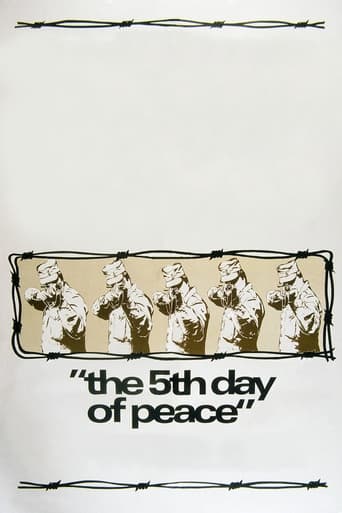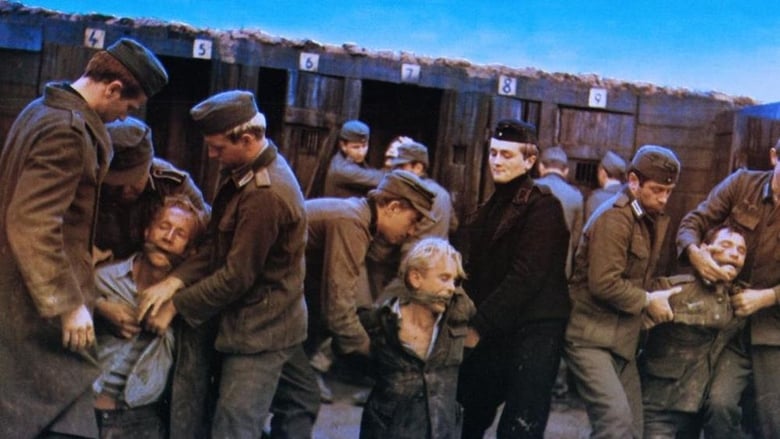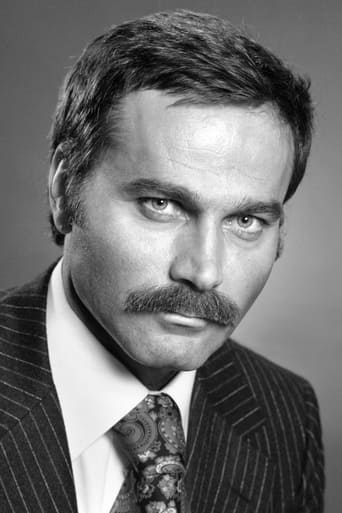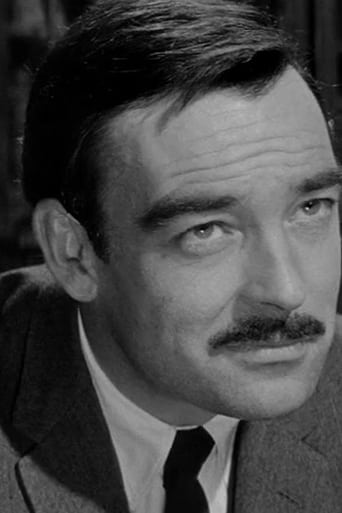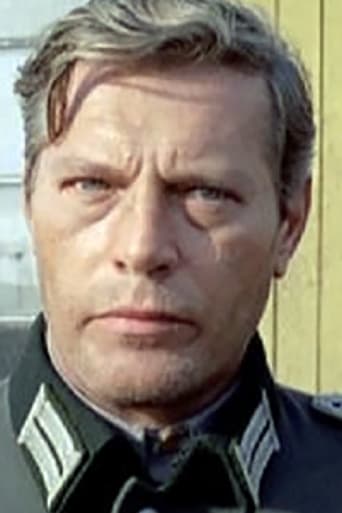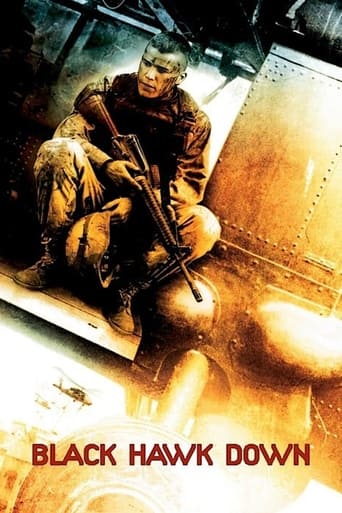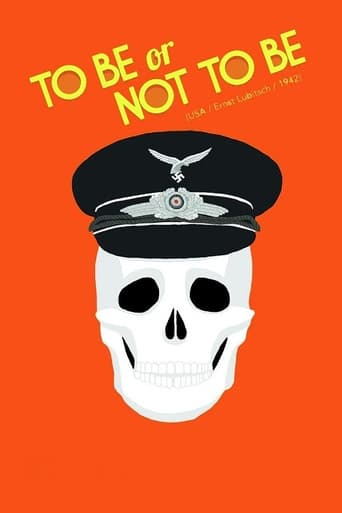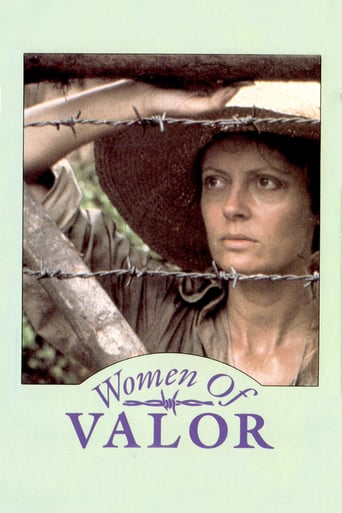The 5th Day of Peace (1970)
Near the end of World War II, two German deserters are put in an Allied prison camp. When Colonel von Bleicher — the rigid and militaristic commander of German POWs — learns about their desertion, he wants them court-martialed, even if the war has since ended. The uninterested Allied officers oblige him, and the two find themselves facing the firing squad on "the fifth day of peace".
Watch Trailer
Cast


Similar titles
Reviews
Touches You
An Exercise In Nonsense
Absolutely the worst movie.
It’s fine. It's literally the definition of a fine movie. You’ve seen it before, you know every beat and outcome before the characters even do. Only question is how much escapism you’re looking for.
This is the French title and it's really a well-chosen one;it's on the fifth day of PEACE (WW2,13th May 1945) that the two unfortunate deserters were executed ;it is based on a true story and it's a brilliant Reductio Ad Absurdum of the absurdity of war and its rules.Absurd is the keynote:although the Nazis are now prisoners of the allies in a former concentration camp ("Arbeit Macht Frei" on the gate),the German Officers ,still faithful to their Führer's Third Reich (which was to last a thousand years),still believing in their rites,want their men to be obedient ,disciplined ;their brainwashing is so convincing that the privates themselves ,although the war is over,do not ask themselves any questions (scenes of the noise they make): the military hierarchy knows that they despise deserters ,draft dodgers and they take advantage of it. Two deserters prisoners are court-martialled and the judges are themselves prisoners !The (British) officer is taken over by events :what's the point of shooting two men when the war is over?but his general is a clairvoyant man :he knows that desertion is not a German problem ,it is something that jeopardizes their army ,and that two poor privates can set an example ;there are no more nations ,but one sacred institution ,the Army ,the duty,the military service :one should remember that when the movie was made in 1970,the draft was existing almost everywhere in Europa (except in the UK)and conscientious objection was still a taboo . Vietnam war had become very unpopular in America.This shows how very topical Montaldo's movie was !And like Losey's "For king and country" ,Kubrik's "paths of glory" or Trumbo's " Johnny got his gun" ,it is still relevant today.Too bad that this movie should be forgotten today !Only Morricone 's haunting wistful melody is known around the world and is included in almost all his compilations .It is not used very often though,the director preferring the musician's martial compositions .NB:Montaldo's follow-up to " Gott Mit Uns" was also a mockery of a trial :the Sacco and Vanzetti affair (we are sure today that at least one of them was totally innocent);in this 1971 work, Morricone asked singer activist Joan Baez to write words to the songs from the movie and she used words taken from the letters of Vanzetti.
Most of the Italian war flicks from the late 1960s and early 1970s were filled with action, adventure and familiar cliches. However, THE FIFTH DAY OF PEACE does just the opposite -- it's an antiwar drama with virtually no combat.It's the beginning of May, 1945. Captain Miller (Richard Johnson) takes command of a POW camp in Holland. He must deal with Col. von Bleicher (Helmut Schneider), the senior German POW, who insists on maintaining a military system of discipline amongst the POWs. Soon, two deserters (Franco Nero and Larry Aubrey) are taken captive. Bleicher wants them shot for desertion; Miller could care less since the war is over.The movie features a fine leading cast. Richard Johnson is excellent as the war-torn Canadian Captain. Helmut Schneider is equally great and very believable as the authoritarian German Colonel. Franco Nero's performance as an anti-Hitler, quick-to-anger deserter is incredibly good and quite over-the-top. It's a pity his voice was dubbed. In support is Larry Aubrey, who I have yet to see in another film. His performance as the innocent young German deserter is good, but doesn't hold a candle to Nero's. Bud Spencer is decent as the kindly Canadian Corporal Jelinek, but he only appears in a few scenes.There is no combat in the entire film. The action takes place within the camp. There are no escape attempts; it's more psychological warfare between von Bleicher and Miller. The two deserters are just the catalysts. The film does a magnificent job of showing how innocent people are often the victims of circumstances beyond their control. The cinematography is marvelous; while practically the whole movie takes place within the camp, it's established quite early that's a muddy, dirty and horrible place to live. The musical score by Ennio Morricone is quite unusual and fits perfectly. The ending is unexpected and very well set up; at an appropriate moment, the story is simply over.The DVD release is a waste of money. It is of poor quality and has no special features. I would recommend the video from Congress, although it's not much of an improvement.The BEST Italian war movie I've seen so far. I give it an 8/10.
Nice piece of mellow lefty Italo-Yugoslavian agit-prop from the late 1960s. Victorious Allied troops face the daunting task of dealing with the aftermath of WWII. Canadian soldiers, led by a career-minded captain, are put in charge of an internment camp for captured Nazi soldiers. When the Nazis organize their little hovel in traditional teutonic fashion, their keepers are impressed. Things get weird quickly, however, when the Nazis desire to execute two soldiers for desertion.One nice surprise: soundtrack courtesy of Ennio Morricone.The DVD appears to be little more than a sloppy transfer from a bad videotape.

